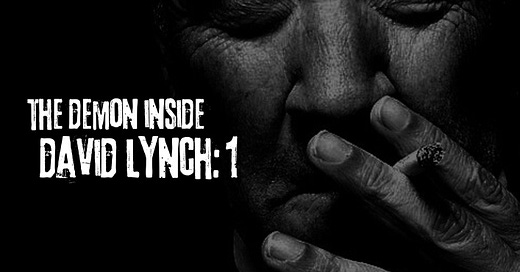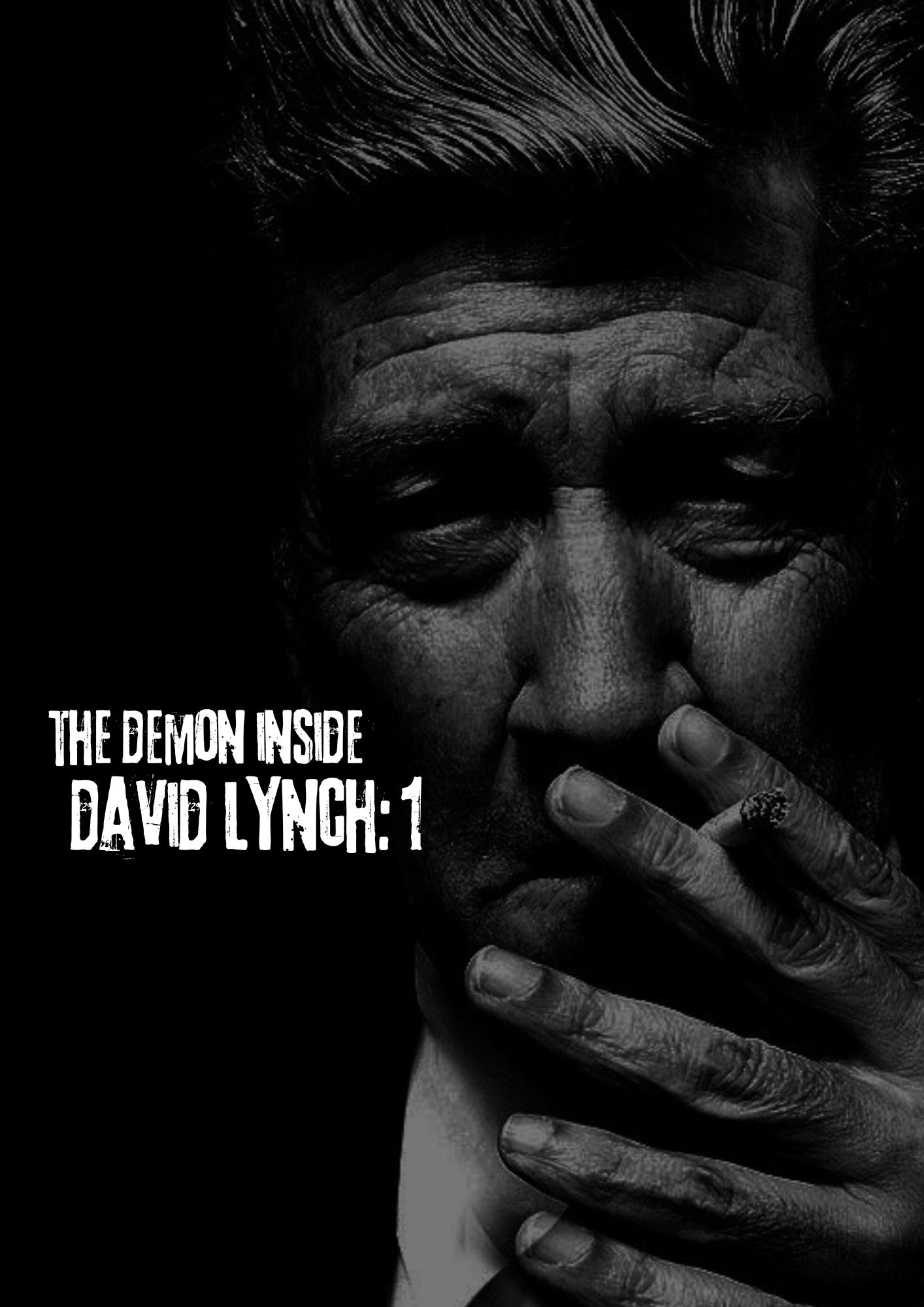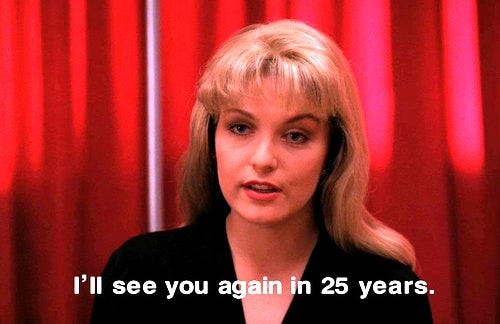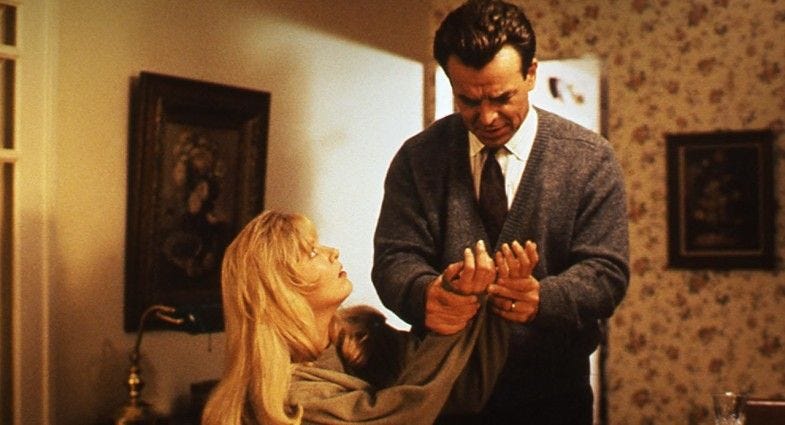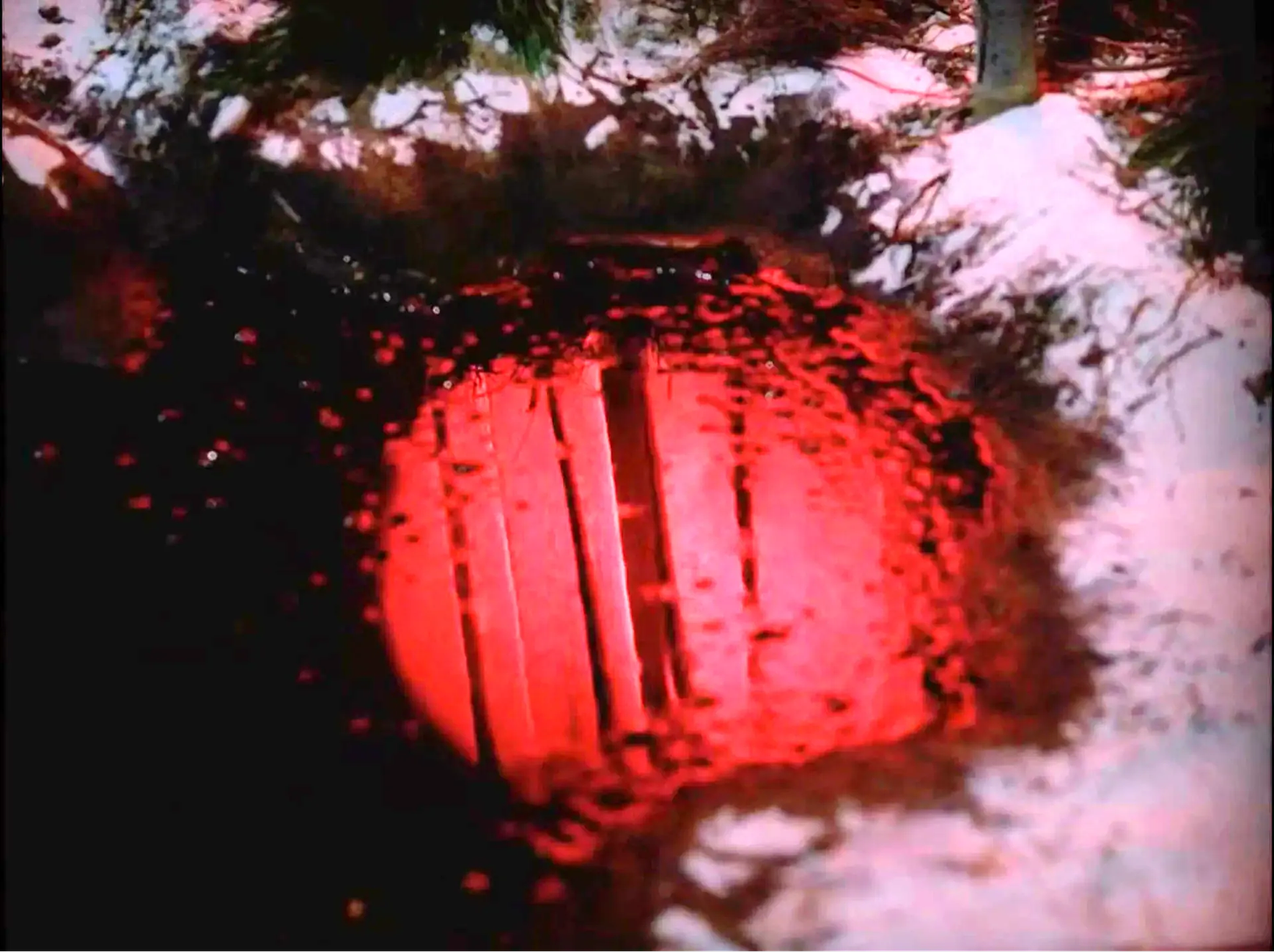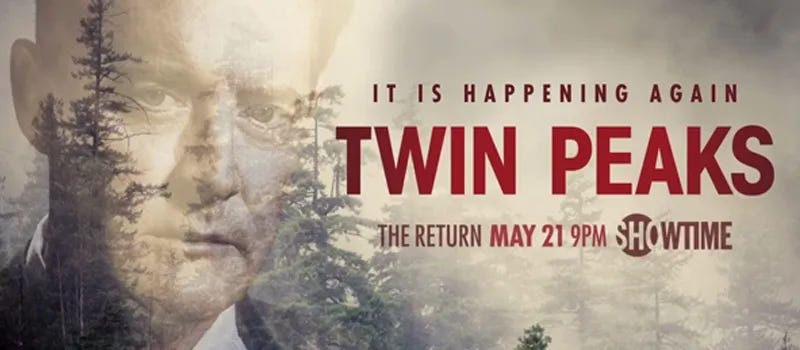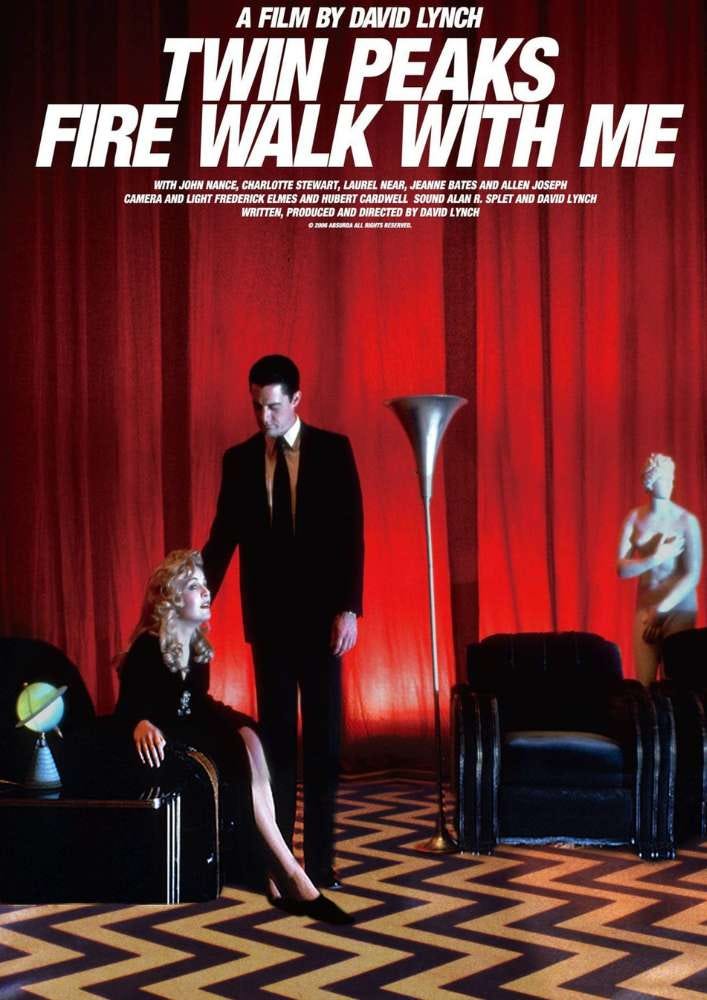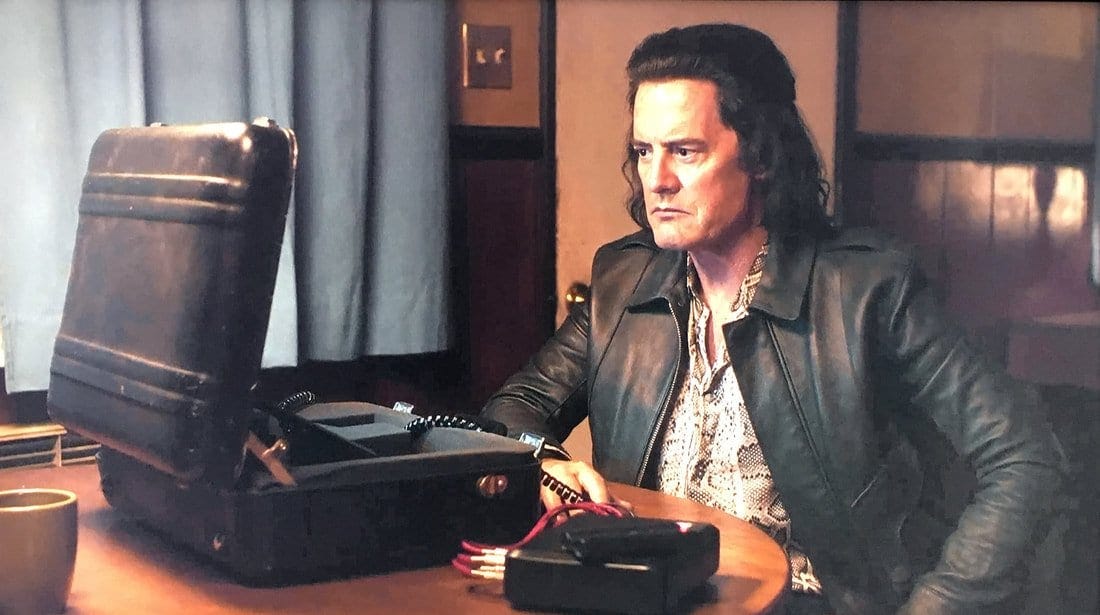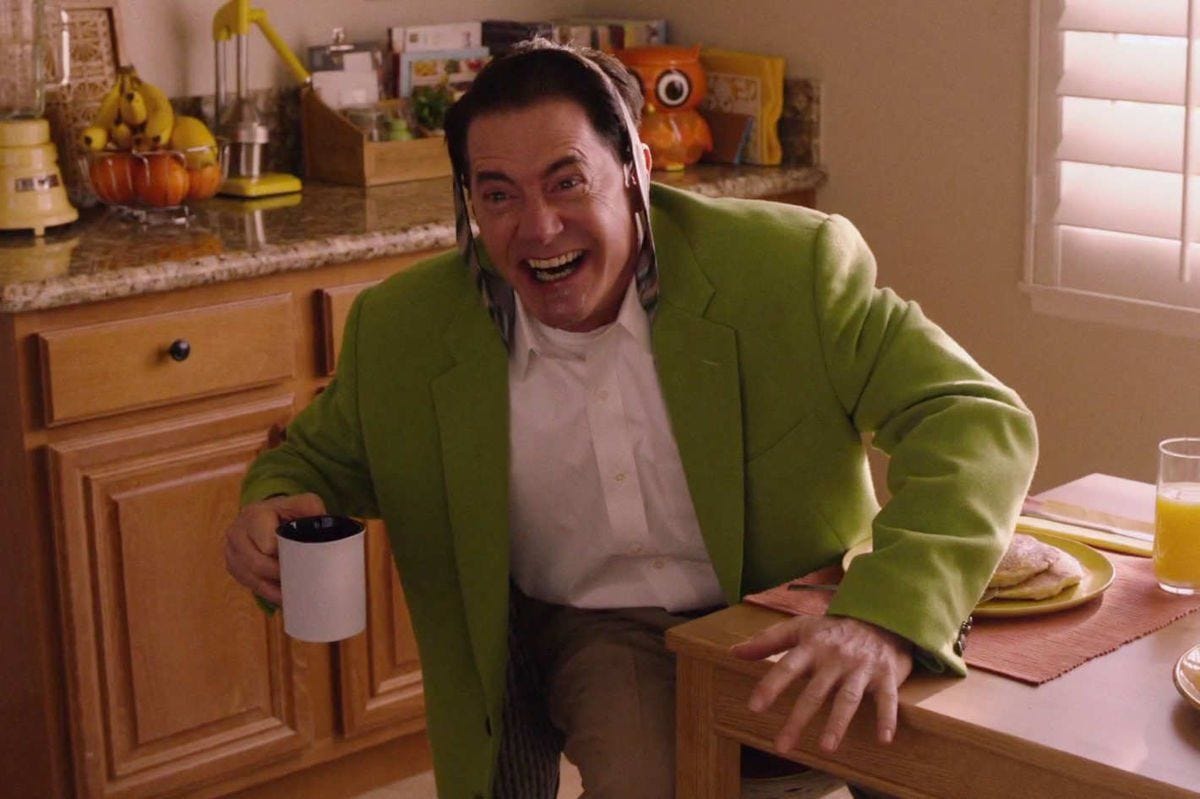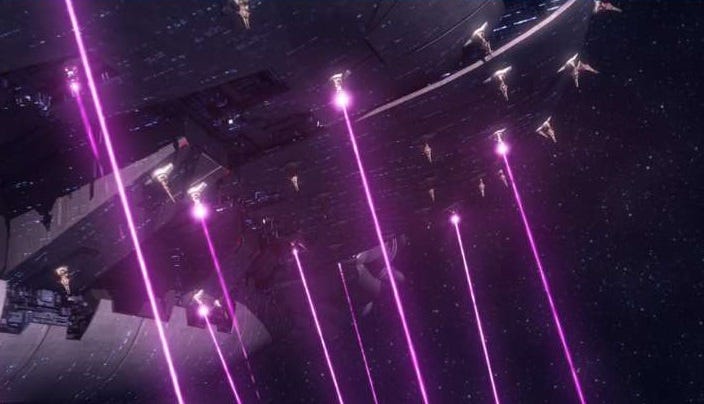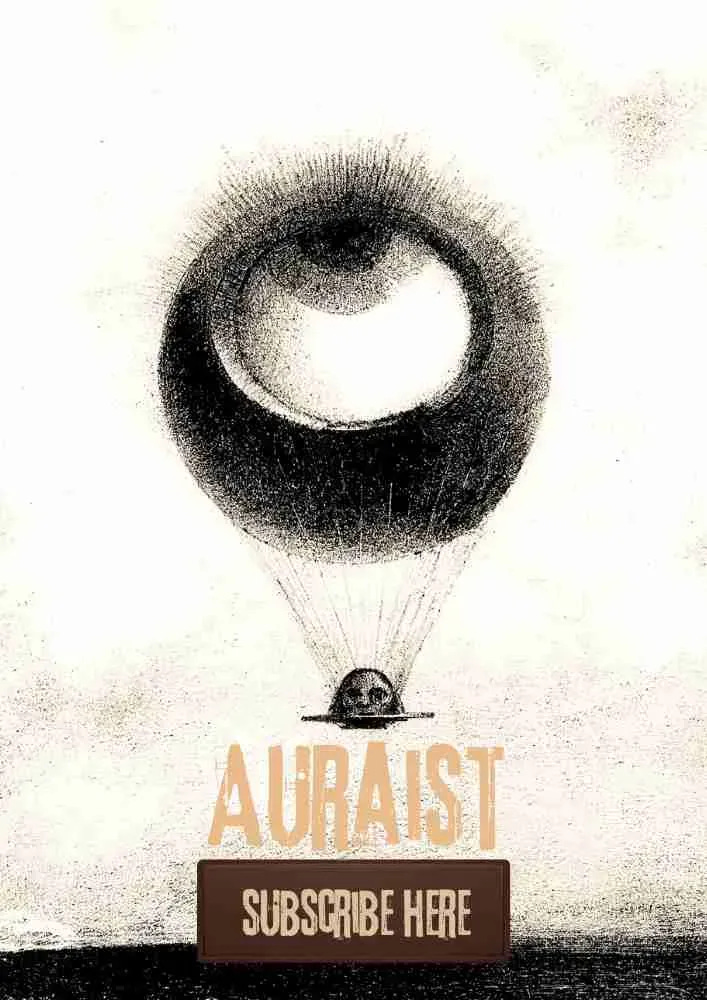The Demon Inside David Lynch: TV Drama's Worst Fiasco.
Ella-Laura ^ Juegos Sexuales ^ All Ready for the Big Night ^ The Contempt-Filled History of Twin Peaks
‘On a surface level Twin Peaks: The Return is the world’s worst-ever TV drama, but when you explore it in some depth, see what its showrunner was really up to, that’s when it gets supernaturally bad.’ So argues nightguard and wrestler Andy Uath, who’s had troubles in his time with bitterness, research chemicals, and the hyperdimensional entities he believes shaped the world and, worse, Twin Peaks: The Return.
In the genre-blurring tradition of Maggie Nelson, Geoff Dyer, and Vladimir Nabokov’s Pale Fire, The Demon Inside David Lynch is a critical novel of verve and urgency about fanaticism, generational hatred, rampant cheesiness, mass groupthink, and our post-truth state, whoever’s responsible for it.
The Demon Inside David Lynch states that the celebrated director was possessed by a ten-dimensional entity that went on to make Twin Peaks: The Return. You won’t be surprised to hear this is fiction, satire. So too are the events in this story involving other public figures such as Michael Gove, Ron Jeremy, Damon Lindelof, Morrissey, Martha P. Nochimson and Slavoj Žižek. But the descriptions of The Return’s content are not fiction, no matter how much you come to believe or wish otherwise.
To M. Boulègue and the rest of the Lynch cult, not least Mr Lynch himself: The Demon Inside David Lynch is no more demonic than the series it’s about. You don’t get to air a work that incendiary and have nobody react the way Andy Uath and others do here. The Demonic Twin of Mr Lynch would be disappointed had nobody done so.
And thanks for the good times, which really were something.
FIRE WALK WITH ME (2016-17)
Laura Palmer
Ella-Laura
‘Sort of a Conor McGregor, aren’t you? Or a pale ginger Sergio fackeen Ramos.’
That was the first thing Ella Ospíndola ever said to me offline. As with many Madrid women who know they’re attractive, her voice was deep, almost guttural. There she stood in Atocha station peering up at me with that smile of hers, innocent enough at its centre but at the corners something else.
An okay beginning to our date, then. Or it should have been okay. But the blood in my head was whomping so loud I couldn’t think how to answer her. She hadn’t looked like this on Bumble. Not this, not a Spanish Laura Palmer. The hair was her own, or Spain’s own, this post-windtunnel style plenty of women here go for. But Ella’s blonde, eyes, lips and poise were all Laura Palmer’s.
It was twenty-six years after Laura’s murder in the original run of Twin Peaks, and fifteen months before the show’s third season The Return aired. David Bowie had just died. Donald Trump would assume control of a nuclear arsenal in just under a year but he already controlled the spirit of the time.
‘I wanna cocktail,’ Ella said, still in English.
‘I don’t drink.’
‘Well, how about a drive then?’
A few seconds of dead air till I said, ‘Pastrana.’
‘What is in Pastrana?’
‘There’s a place,’ I said.
‘And does anybody make cocktails in this place?’
‘Unlikely.’
As we reached my shameful Fiat Multipla and drove off, my head replayed this exchange, editing it first in my favour and then so I sounded even dafter, tenser, creepier.
‘Are you fine with your job?’ I asked. Ella did PR for the city’s only organic house night, Strobes + Robes. ‘Happy with it. Your job.’
She crinkled her nose and said, ‘Yes I am fine with my job, Andy. Happy with it. My job.’
Sweat ran down my back. Raindrops meandered down the windscreen.
I searched my whomping head for another question to ask her. ‘Ever thought that we live inside a dream?’
‘Qué?’
‘That we live inside a dream.’
‘Certainly.’
‘Right. Me too.’
‘Right.’
‘Right.’
My curling toes rose off the pedals and the pitiful car slowed down and jolted.
We continued on and Ella told me about Strobes + Robes, denying, falsely as it turned out, that any clubbers there wore robes. She’d been studying for almost a decade at Complutense University, and spoke about her thesis on overcoming the pain of breast cancer and chemotherapy with the help of various spiritual tools and research chemicals and ‘ten-dimensional entities from the Dark Matter which makes up 90% of our universe’. It sounded pretty woo, though I liked the confidence it took to talk this way minutes into a first date. But the blood in my head was so loud I hardly took in the details.
‘Could I interest you in some drugs, Andy?’
Hours later we were driving through central Madrid high on her research chemicals. We were agreed on all matters, from the absolute nature of love’s cosmic victory to the miraculous way her MDMA-like 3-FEA combined with her mushrooms-like 4-AcO-MET and LSD-like AL-LAD, to the underappreciated-because-understated charisma of the Multipla, to the miraculous nature of the tiny drug-generated quintessential gods, goddesses and god/desses that every time we moved or spoke came shedding off us. Quintessential beyond quintessential, but they weren’t just clichés, weren’t just archetypes, but actual miniature goddess-Ella-Lauras and god-Andy-Conor-Sergios and god/dess-Ella-Laura-Andy-Conor-Sergios gyrating around us. Which meant that although the goddesses were more monstrously seductive than any pornstar, they were as far from porn as it was possible to get, whole dimensions away from porn. Our dimension’s most beautiful women were mere shadows of these beings, and I was on a druggy first date with them and the Spanish Laura Palmer shedding them.
‘And Twin Peaks and the Twin Peaks film Fire Walk with Me,’ I said. ‘And David Lynch. They’re miraculous as well.’
‘Here is to Twin Peaks and the Twin Peaks film Fire Walk with Me,’ Ella said. ‘And David Lynch.’ She snorted the last of the 3-FEA.
‘David Lynch is my AA and GA higher power.’
‘What is GA, then?’
‘Grapplers Anonymous,’ I said.
‘I see,’ she said, drawing the letters AA in the windscreen’s grime so they formed twin snowcapped mountainpeaks. ‘Will you be grappling me?’
‘You know you look like—’
‘So I have been told. And told.’
‘And Twin Peaks is coming back next year.’
‘Groovy.’
‘I hope so.’
We drove along Velázquez past bars and clubs manky with money and the dirt of trade, then stopped outside the Okka Hotel. Once we’d navigated the revolving door we made our way to a table in the bar, where I asked the waiter to bring Ella a bottle of champagne and me a chorizo bocadillo.
When the champagne and sandwich arrived Ella-Laura applauded and the waiter drew the cork and filled her flute. Ella-Laura and the gyrating goddesses and god/desses raised their flutes and said, ‘Here is to the recovering alcoholic and wrestler Andy Uath and the little gods sharing his bocadillo.’
We lifted our sandwich in salute and answered, ‘And to the drug addict Ella Ospíndola and her monstrously seductive little friends.’
Time passed. The champagne bottle emptied. Guests and staff tried not to stare at Ella.
‘Rude, is it not?’ I said. ‘They’re leering at you but not your monstrously seductive little friends.’
‘Oh sí, Andy Uath. The leering is just not evenly distributed, is it?’
We chatted about the Satanic nature of table-service nightclubs, then the kind of sex we liked. It was now nearly midnight and we agreed we’d had a special time of it. The world was whirring.
‘Infuckingseparable,’ I said. ‘Andy and Ella and their god and goddess and god-slash-dess friends.’
‘Infackeenseparable,’ Ella answered. ‘EllaanAndyantheirgoddessngodngodslashdessfriends.’
Then we were on the Parantine Hotel’s deserted roof terrace. She had a new glass of champagne and a lit Fortuna, and her Laura Palmer figure was bent over a turret wall.
Far below us moonlight flowed through alleyways, a cool reflection painted on the dark. You could hear a faint echo dirl below the city’s traffic and nighttime chatter, barely an echo refracted from the skies’ crystal, some kind of warning dropped down to Madrid, to this terrace, from the night’s moon-soaked dome above. I was very high.
That dome was just enormous. Constellations blinked down their uncrackable codes, stars rose like champagne bubbles. I felt myself float high above Ella and travelled inside those heaps of stars, gliding along the sandbanks of the Milky Way. From tonight the stars might feature a brand new formation, the zodiac’s latest sign: The No Longer Boozing or Wrestling Nightguard.
Ella floated up to join me. Past my shoulder flew her cigarette. Her voice fell low and sank into her chest: ‘I should maybe have put this on my Bumble profile.’
She slapped my face hard, tiny goddesses and god/desses spraying away from it with gleaming eyes.
Grinding her teeth as her breasts brushed my chest, her face seemed to recede as her pupils widened. She leaned her head left and right with that smile of hers and tried to catch my reaction to her slap and post-mastectomy fake left breast. There she waited in my hold with the stars and little deities reflected in her expanded pupils.
She ran fingers over the scars across my backside and thighs, slid down her knickers and kicked them off all the way down to the terrace.
I squinted and unsquinted at this Laura lookalike, revival, remix, saw her blur and sharpen, shrink off among the galaxies then loom towards me again as both a supernova and a black hole.
Laura and Leland Palmer in Fire Walk with Me
Juegos Sexuales
When I was twelve I was coached in sexual wrestling. Which girls got really into, said my seventeen-year-old brother Dougal, who’d escaped being tortured and raped by Maddy and Demmy and Suds by toughening up at the local wrestling club and had encouraged me to do the same.
It had been one of the prides of Dougal’s life that he’d already initiated a number of girls into the sophistication of wrestling-inspired bedroom activity. These sessions with sexualised grips, throws, and cries of ‘Submit!’ etc., he advised in Buckie, Moray, Scotland in 1992, should mean your girlfriends never grew bored of you. Himself, he could take or leave the grappling stuff. He did it for the girls’ sake. The truth was he liked a bit of tenderness.
‘And you do it so you dinna get dumped,’ I said.
‘That I do, Tits. And if you dinna get dumped you can be around when they need you.’
‘A different sort of tenderness.’
‘But not so they notice it. Not so they think you’re tender. Trust me, boyo, the day you get dumped for being too tender you’ll start grappling them about the place.’
‘Why wait for that?’
He held up his beercan for me to clink with mine. ‘Baby,’ he said in the voice of Blue Velvet’s headcase Frank Booth, ‘wants to fuck.’
When gone on mushrooms or cheap lager of the kind Frank Booth drank, Dougal sometimes pretended he was Frank or Twin Peaks’ headcase Leland Palmer. This mainly involved wearing a leather jacket like Frank’s or a cardigan like Leland’s, huffing gas from an imaginary canister or shining an imaginary torch in your face, using Frank’s designation Tits, saying Leland’s line Are you hungry?, or the expressions Baby wants to fuck or Fire walk with me.
It was awkward to watch this in the same way it would later be awkward to see friends wear striped jumpers and inject heroin because Rents does so in Trainspotting, which meant that when he acted up this way I tended to avoid eye-contact. But for better or worse, throughout the ‘90s variations on this persona would draw to him funny, smart girls and women with certain inclinations and apparently keep them keen.
And a factor in this, he maintained, was surprising numbers of Scottish girls and women deciding that decade to wear microskirts, high heels, fake eyelashes and fingernails, heavy make-up and fake tan, hair extensions, to get boob jobs and bleach their teeth disturbingly white, and it suddenly becoming easier, as he put it, to get girls and women to go along with less lovey-dovey sex.
Partly a David Lynch effect, he believed, which I now agree with, but also a widespread pre-millennial sense of culturally exhausted, jaded surrender to Total Capitalism. The first encroachments of internet porn’s dead-eyed mindlessness and sociopathy, Loaded magazine, ladettes, Wonderbra ads everywhere, Trainspotting and ‘The truth is that I’m a bad person’, kitsch YBAs, a shift from soul-sister freaky MDMA dances in dungarees and no makeup in warehouses to faux-ditzy coked poses in fluffy bras and microshorts in soulless table-service hellholes, Lost Highway, a pervasive air of hungover lowest-common-denominator defeat that English brainiac Mark Fisher labelled capitalist realism, the surrender to Total Capitalism no matter what, all of which will matter for what follows due to the resulting sense of if you can’t beat them join them, which then became the air everybody breathed (or nearly everybody), an acquiescence that then made other escapes and spine-straightenings feel unlikely if not impossible.
It matters too for what follows that Ella and me weren’t easily shocked or offended when it came to sexual aggression, risky dark games, close to the bone humour, or much else. Neither of us was a princess/pea type on the lookout for things to find offensive. After all, we were both fans of David Lynch.
‘Like Lynch himself,’ Dougal told me, ‘it maybe didna do any of us any good in the long run. But it had become much easier to play the heel and bring your girl along with you.’
I couldn’t really judge the truth of this because I started sleeping with girls in 1994 when that zeitgeist was already here. But it was possibly a factor when Dougal’s quiet younger brother moved down to Glasgow and heeded the rest of his romantic advice and occasionally found it worked.
A woman who slapped your face to communicate her inclinations was probably always going to respond well to Dougal’s approach, though at times I was hesitant about charging in with the grips and throws, truth be told, because they felt a bit too close to grappling relapses (I never told my GA sponsor Les I wrestled Ella, or that I took her drugs). It’s not easy to accept this, but it’s possible this whole Lynch story and therefore what happened with Ella would have taken a different course if we never wrestled.
Her thing was sexual roleplay, a leaning that was due, she lied, to the times she’d inhabited hyperdimensional entities in Dark Matter, i.e. lived within their dumpy bodies and experienced everything in 10D while she tripped on the heaviest of all research chemicals Tsarbomba AKA 8-BOM-DMT (she stayed in bed for days after these trips, just peering into space, so I promised myself I’d avoid that drug).
But we didn’t use the word roleplay. When we wrestled we had to be her suggestions: Lana Del Rey versus Conor McGregor, ETA terrorist versus Francoist captor, Astrid Bergès-Frisbey versus Javier Bardem, Silvia Perez Cruz versus The Night of the Hunter’s Harry Powell, and almost too good to be true, Lynch’s Wild at Heart’s Lula versus Sailor from the same film, Dorothy Vallens from Blue Velvet versus Frank Booth, Laura Palmer versus Ben Horne, Dr Jacoby, James Hurley, Bobby Briggs, Harold Smith, or random truckers from Twin Peaks. Ella’s other favourite roles:
>>Nada, nothing.
With this one I had to call her Nada, a void. This role had its source in her Advaita Vedanta tenet that she didn’t actually exist, because the self is illusory. When she learned a Scottish way to say nada was hee-haw she told me to use that too. It feels quite odd to grip a woman you love and tell her she’s Nada and Hee-haw.
>>She owned a ridiculously expensive, ridiculously proportioned yet otherwise highly realistic sexdoll that joined us for three-way bouts, a doll designed by someone with a serious knack for shaping thermoplastic elastomer bodies that make you climax shamefully fast. (As you’ll see, it’s now hard not to view our relationship to this doll, which Ella had named Chica, as similar to the one the 10D entities have with humans).
Another of Ella’s favourites was therefore when a younger Ella as played by Chica joined me for a bout in which I grappled her until the real Ella ventriloquised her shouting out ‘Submit!’ and admitting that she didn’t exist.
>>A singer-songwriter named Dotty whose music Frank Booth despised.
In this scenario I had to grapple Dotty into calling out ‘Submit!’ and giving up her musical vocation. We might hire one of Montera’s hookers to play a rival singer-songwriter, and hand Chica a cardboard guitar, two or three of us now grappling each musician into jacking in her budding career. As time went on, Ella got carried away and started throwing with a ferocity that became too unpleasant for everyone’s tastes. The issue, I later discovered, was that when it came to singer-songwriters she was heavily conflicted.
From then onwards we played it safe and stuck to the classics already mentioned, plus Laura Palmer versus Mark Fisher, Laura Palmer versus an even dirtier-playing Sergio Ramos, Laura Palmer versus Keanu Reeves’ evil doppelganger, Laura Palmer versus anyone she wanted, living, dead or imaginary. She knew her Laura looks were a big part of the attraction for me and as long as I played Keanu and the like, she didn’t seem to care.
It has to be said, mind you, that the first time she did herself up in Laura’s schoolgirl gear, I froze in my role as a wrestling Harry Powell and instead of a macho maniac sermonising on the eternal battle between good and evil, all she got was a shaky mess who dried on his lines.
But our least successful bout was when we tried out Laura Palmer versus David Lynch. Our night out was fine, especially when our 3-FEA kicked in and my nasal Lynch accent flowed more naturally as we discussed potential Lynchian grips and throws. But when we got back to my flat the night became less fine. My discomfort months later over Lynch’s boast in The Return’s finale that he’s ‘not soft where it counts’ was surely not unconnected to this flop.
Ella was her usual loving self, of course, and informed her boyfriend with hair quiffed for the night how much Laura loved David’s penis regardless of its fackeen state, then delivered a poker-faced talk on the aesthetic and even the spiritual appeal of David’s current state of wrestling-readiness, and warned him not to forget the core truth of Eastern philosophy, that while that state was real (all too real), the person, the ‘David Lynch’, apparently attached to it certainly wasn’t, was in fact a concept only. Which did the trick and snapped me out of my self-consciousness and therefore my embarrassment, so I was able to successfully grapple with Ella-Laura as Andy Uath.
I can only assume that some kind of mystical link, some form of anti-Sex Magick, was established that night between me and my Lynchian hair and clothes and, even though no one knew about it at the time, Mr Lynch’s impotence inside his own body.
Ella was far more cultured than me, and would go straight from my flat to see her cancer doctor in whatever Felliniesque outfit she’d worn the night before and send me opera recommendations from the waiting room. She was delicate when it came to my childhood and scars and occasional lows due to them, so bighearted she was cherished by pretty much everyone who knew her, and she understood that what happened in the bedroom had little relevance to how we were outside it. I didn’t surprise her with grips and throws in parks, cinemas, clubs, restaurants or theatres. In those situations I was reasonably civilised, as I just wasn’t the type to grapple with my girlfriend in public. It would have felt wrong somehow.
GA/AA-style real equality, fellowship, democracy was in fact possible in a romantic relationship, I was learning, at least if you’re fortunate enough to meet someone like Ella, a woman so comfortable and centred in her love that it kills the self-worth worries that breed all status fears.
Plus it must be hard to take those kinds of fears seriously when you regularly trip on Tsarbomba and roleplay entities as they zip around in their squads of ten supervising ten dimensions (or maybe it’s nine dimensions; on this question they’ve never given me a straight answer). And her Advaita Vedanta teaching that the self was illusory told Ella she was those entities, as well as everybody else, something I found difficult to get a handle on at first, and even then it took the events that follow to smash my denials and everything else away and leave me wide open to this possibility. Every aspect of life was roleplay to her, she claimed, including our adopted roles as ‘Ella’ and ‘Andy’, a faux-naive game of hide and seek with yourself in which you deny who or what you really are. Advaita means non-duality, by the way, a subject at the heart of each iteration of Twin Peaks.
Things between us were also kept healthy by AA and GA, and not only due to the fact they helped stop me relapsing. All recovery fellowships identify isolation as a key component of addiction—‘Addicts are people who think isolation’s a cure for loneliness’—and most groups try to be as friendly as possible (or good groups do; hip groups can be as pursed-lips cliquey as hip gatherings anywhere). They offer themselves as loneliness-killers, these groups, and if you get over your snobbery and shyness—‘Addicts are egomaniacs with low self-esteem’—and make an effort to get close to people, get into the middle of the bed, as they say, it should mean an end to your days or decades of loneliness, because friendships in recovery tend to be close and lasting. If you’ve seen your friend on an ICU drip after a booze or grappling relapse, or talked them down off a hotel roof, or they’ve talked you down, that bonds the two of you fast.
These friendships can go as honest and intimate and deep as you like, as recovery types are more comfortable with talk about lingering self-hatreds, external hatreds, plus actual and metaphorical scars, personal transgressions, extreme personal failures generally, metaphysics, all-defences-down panic about e.g. the climate or Covid or Putin’s nukes, whatever you want, than other crowds I’ve known, as long as the talk’s focused on practical results like remaining sober, conciliatory, sane, productive and useful, and doesn’t turn into intellectual one-upmanship or tragedy-porn grandstanding.
The friendships tend to cross the age and demographic spectra too, so you might go to watch Atlético with a formerly all-day-tippling primary-school teacher, a girl just out of school and a boy just off the streets who’re hooked on synthetic cannabinoids and whose tickets everyone else chips in for, a model who’s also a distributor of illegal substances yet always skint due to gambling, and whose ticket we chip in for but grudgingly, someone who hands out shoes in a ten-pin alley and has to restrain himself from wrestling lippy bowlers, a Scouse dosser who does little but help fellow addicts, a Nazi Satanist Serbian giantess who when drunk wrestles fellow nightguards, and a Monahan bloke who footering with Semtex under the influence blew six of his fingers off. To be honest, if you hang out often with these kinds of groups then more homogenised gatherings can feel boring.
And these recovery relationships are good news for your romantic ones because now you aren’t someone who has to be involved romantically to overcome their loneliness or even just to find some affection, which means your partner is less inclined to take you for granted, which destroys more relationships, you’ll agree, than anything else.
So Ella Ospíndola was in every sense The One. She didn’t only meet every hope I had about what a woman might be, but showed me, or even invented on the spot, entirely new categories of behaviour and charisma I could love.
She was also a witch—of the white variety, she insisted—which felt as though the universe was overdoing this gift. A sexual and spiritual one-off who looks like Laura Palmer and shares some of the world’s best drugs, who also sends me pics of naked dances with her coven?
A puddle of engine oil in Twin Peaks
All Ready for the Big Night
When I arrived at my flat on Montera I took the latest supplies from shopping bags and began to decorate the front room for tomorrow night’s premiere party, so doped up on sex and love and on research chemical afterglow I could barely remember who or what I was.
I was a recovering grappling addict and alcoholic in the top 40-50% of screwed-upness and volatility among those in GA/AA, which might not sound that great but was progress on my early years in these fellowships, which themselves showed progress on my years as an active drunk and sudden grappler, which themselves showed progress on my state of mind as a child.
I was a nightguard at Santa Rita’s psychiatric hospital, where my colleagues were unusual.
Trinna K. was an alcoholic Serbian giantess with hormonal problems that sometimes made her weep with overexcitement when we discussed public wrestling, which I’d been banned from because I fought too dirty and which Trinna’s father and ex-wife had never let her do professionally, so what the families of patients sometimes saw as they visited the hospital was respect and envy for pro-wrestlers as it poured in rapid Serbian from this woman paid to guard their psychically delicate son or grandfather, and me reaching up to pat her colossal shoulder and calm her down, one time in AL-LAD afterglow crying myself with joie de vivre.
My supervisor Jorge didn’t spit at you if he was angry, but he did spit just past you at the nearest wall, left of your head then right and back again, which only ended during the pandemic, when he had to stop himself spitting in his own mask. This father of four claimed he couldn’t wait to die and be reincarnated as a female guard generous with her favours among the hospital’s patients.
Ecologistas Insurreccionales founding member Jorge was engaged in a feud with the National Socialist and Satanist Trinna, a feud that mostly consisted of them raging in their respective security huts and training the CCTV cameras on each other and nowhere else, so when the cops turned up to investigate the latest violent clash between patients and asked to view the CCTV files, all they often saw were close-ups of two guards in their mid-forties as they practised their Sieg Heil or their spitting accuracy, downed Aldi’s own-brand vodka, cried convulsively, browsed online for pentagrams and goat skulls, or for survivalist camouflage or lingerie ahead of the climate apocalypse or of reincarnation, close-ups that the cops’ body language suggested they thought I was responsible for.
When they called a summit to discuss the hospital-wide thefts our team’s unorthodox approach to security had facilitated, our colleague Har from rural Andalusia fingered the gang that sometimes lurked near his hut: four guilty-looking crows.
This hospital for the mentally ill also had a crazy-golf course. It did.
But working at Santa Rita’s stopped me losing my mind completely. When sent to work there at first I did not want my nightly environment to be a psychiatric hospital. I was a mess at the time, boozing and pilling far too much and surely in the top 20% nationally when it came to screwed-upness. But luckily part of my duties at the hospital was to open up room E5 for AA meetings and set up the pamphlets and books and two bronze sculptures of the AA symbol of a triangle inside a circle. One night as I carried those sculptures across the room I abruptly knew for certain that I would never beat the drink by my own efforts. Never. I understood what had been obvious for years to everyone who knew me. But not me. That’s the thing about denial. It can make the most obvious fact of all, the fact it’s built your life around denying, seem like it’s from another planet or dimension: you won’t beat this problem by your own efforts alone. Submit. You need help, boyo.
This wasn’t any kind of rock bottom, but it was the absolute defeat I’d sought in my rock bottoms without knowing it. Absolute surrender, and acceptance of that defeat. A vertical insertion of data, that’s how it felt, from some mysterious source. At the time of this mystical insertion I was of course carrying Alcoholics Anonymous sculptures across a room soon to fill with a bunch of ex-drunks, but honestly it’s now hard not to view this lucky break at Santa Rita’s as an interference by the hyperdimensional entities, a necessary part, and one I still don’t really understand, of their David Lynch project.
I asked the AA secretary Diego P. for the list of meetings in Madrid and he became my sponsor until I met Les W., who had experience with recovery from grappling as well as booze and compared to Diego was obviously on a different level of wisdom and solidity. Useful in the early stages were our daily ‘fire drills’ when I’d phone Les up and roleplay having an urge to relapse, which made it easier to ring him for support when I actually had such an urge.
It helped that I was already familiar with AA’s main text, called the Big Book, and that I’d to open Santa Rita’s gates to admit ambulances throughout the night and watch tearful bloodsplashed drunks wheeled in on trolleys, and every now and then a relapsing sudden grappler, and witness close-up the future waiting for me if I didn’t do exactly what Les told me. It helped too that when the AA crowd left E5 they’d a dignity about them—straight backs, eye-contact, faces not twisted in self-hatred—that my own existence had lacked for years.
After twenty months of sobriety and only grappling in the bedroom I took Trinna to AA and GA meetings too, though sponsoring her then proved a challenge. Our similar histories with drink and wrestling and rape, and also to be honest her tears and bubonic-looking acne, made me warm to her more than I perhaps should have considering her politics and devil-worship, with the result that the tough love sponsorship requires was sometimes beyond me.
Took me all day, but at last I’d my flat decorated the way I wanted. Red drapes, chevron-patterned lino, tree branches, plastic owls, small puddles of motor oil, etc.
A few hours watching WWE would be followed by the night’s main event, Twin Peaks back after twenty-six years, ‘the pure heroin vision of David Lynch’ as we’d been promised, a party with Ella’s coven and a few of the robe-free among her Strobes + Robes crowd, plus my recovery friends and sponsees, plus Les and his normally mellow Rottweiler Stanley, and Dougal who’d be flying down from Glasgow. Also my friend César Grez who after years living in Austin, Texas was back in Madrid wearing a greying manbun and jeans too skinny, way too skinny, for a man his age.
Next it would be some time with my Spanish Laura Palmer, probably gentle and celebratory with no fancy grips or the like. Then before I slept I’d get down on my knees and thank my higher power Mr Lynch for helping me through another day.
The Contempt-Filled History of Twin Peaks [includes spoilers]
Twin Peaks Season 1 (1990).
Showrunners Mr Lynch and Mark Frost.
Seven episodes of TV history fired up by contempt for most previous TV drama. Centres on FBI Special Agent Dale Cooper’s hunt for the killer of troubled schoolgirl Laura Palmer. Much of it hasn’t aged that well but at the time of its first broadcast it was one of the most innovative series ever made. It won two Emmys.
Killer BOB
Twin Peaks Season 2 (1990 to 1991 in the US, 1991 in Scotland).
Showrunners Mr Lynch and Mark Frost.
Seven more episodes of TV history that climax in Episode 14 with the revelation that Laura Palmer’s rapist and killer was her father Leland channelling the demonic entity BOB, which decades later gave us a clue about Mr Lynch’s fate. Next came fourteen episodes of widely ridiculed chaotic mince. No Emmys for Season 2.
Fire Walk with Me (1992).
Feature film directed by Mr Lynch that contemptuously rejects much of Season 2.
Loathed by the critical gatekeepers and booed at Cannes on its release, it depicts Laura Palmer’s last seven days alive, including her mother Sarah enabling Leland’s extreme abuse, followed by Leland/BOB bludgeoning Laura to death, which she let happen to prevent herself being possessed by BOB. A radiantly compassionate portrayal of incestuous abuse.
Mr C and Dougie Jones in Twin Peaks: The Return
Twin Peaks Season 3 (2017), the revival that’s usually called The Return.
The showrunners were believed to be Mr Lynch and Mark Frost. Launches on most of the above nostalgia-ruining, obliterating total war.
Its premiere at Cannes got a five-minute standing ovation, Manhattan’s Museum of Modern Art screened its eighteen episodes in early 2018, Vulture had it ahead of Mad Men as the best series of the decade, Jim Jarmusch called it the best American film of the decade, and Cahiers du cinéma called it the best film of the decade anywhere. No Emmys, however.
The plot centres on the psyche of Dale Cooper, which has been split in three. One part dwells within the crime boss, killer and rapist Mr C, who’s inhabited too by Killer BOB and rampages about various US locales seeking co-ordinates to a mysterious portal. Another part dwells within the literal manbaby Dougie Jones who works in Las Vegas in insurance and is bullied by his wife Janey-E and almost assassinated by the mobsters the Mitchum brothers. The third part is Cooper himself trapped in the otherworldly Black Lodge.
In Manhattan a young man called Sam watches an empty glass box every day, then when a young woman Tracey seduces him a bizarre entity called the Experiment appears in the box and eats them alive. FBI Deputy Director Gordon Cole and agents Albert Rosenstein and Tammy Preston hunt for Cooper so that with his help (and though they don’t know this, that of the divine Fireman) they can defeat the Experiment, an ultrahorrific transdimensional entity also known as Jowday and Mother who was released into the world by the first atomic-bomb test.
In the finale British security guard Freddie Sykes AKA Green Glove defeats BOB and frees Mr C’s spirit to enter Cooper, who then travels back in time and prevents Laura Palmer’s murder. With his former secretary Diane Evans he transfers over to another dimension to find the undead Laura and defeat Jowday.
In Twin Peaks: The Extinction-Level Event a starship fires its lasers to salute the auteur’s golden phallus
Season 4, Twin Peaks: The Extinction-Level Event.
Showrunner the Demonic Twin of David Lynch.
One hundred-hour episode written and directed by the Demonic Twin, who also plays Gordon Cole. Full of contempt for anyone and anything that isn’t David Lynch or his Demonic Twin.
The first ten-hour segment is a mashup of John Cage’s ‘4’ 33’’ ’, Gaudí’s Basílica de la Sagrada Família, M-Brane theory, spacetime superfluid theory, and every volume in Borges’ Library of Babel, which is an actual place and was exhaustively investigated by the Twin.
The next ten-hour segment is a fondly nostalgic celebration, not a dry eye in the house, of the most poignantly mesmerising spills of coffee in the life of David Lynch.
The next one’s based on King Lear and consists of a ten-hour love test in which the thousands who declare their love for the FBI Deputy Director—actresses, musicians, astronauts, chess grandmasters, sherpas, you name it—fawn as toe-curlingly as Mike Pence did to Mr Trump, and are treated as contemptuously as Mr Trump treated Mike Pence.
‘I am the red-blooded god of gods Osiris, you clowns and scumbags, and get a load of this,’ the Twin announces to kick off the Cole’s-golden-phallus-centred fourth segment, which tells the monumental saga of an entire universe, all its galactic federations down to every single quark, dedicated to a competition to see who or what can hymn that shiny phallus to the highest summit of reverence and rapture.
From the fifth segment onwards the auteur’s self-regard gets a little out of hand.
We won’t pay The Extinction-Level Event much attention, because when it was discovered what had happened to Mr Lynch this season was never broadcast. It looks like it would have been TV drama’s historic low but it really wouldn’t, lacking the finesse of the only other contender for that title. It’s too crazy, carried away, Finnegans Wake to the true champion’s Ulysses.


